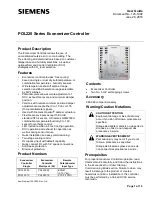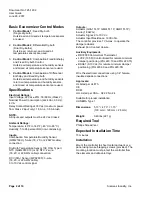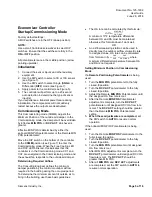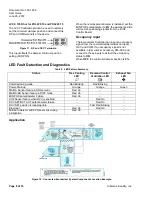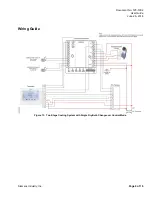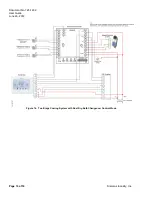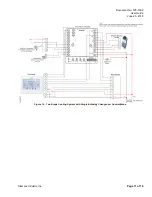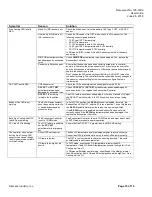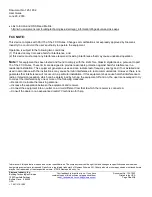
Document No. 125-1902
User Guide
June 26, 2018
Page 6 of 16
Siemens Industry, Inc.
Selecting the Shut-off Temperature and
Enthalpy Setpoint
The damper will be open and will allow for free
cooling below the temperature shut-off setpoint
selected from one of the six DIP switches located on
the bottom right corner of the controller cover (see
Figure 7).
The numbered DIP switches correspond to the shut-
off temperature values (see Table 2). When all of the
DIP switches are in the down position and no
number is selected (factory default), the default
temperature shut-off setpoint value is 75°F.
Table 2. Shut-off Temperature Values.
Default
1
2
3
4
5
6
75°F
50°F
55°F
60°F
65°F
70°F
80°F
For Economizer operation based on both
temperature and humidity, the enthalpy shut-off
setpoint value may be selected from the following
lettered DIP switches. When the three DIP switches
are in the down position, the default enthalpy shut-
off value is 28 Btu/lb.
Table 3. Enthalpy Shut-Off Values.
Default
A
B
C
28 Btu/lb
22 Btu/lb
24 Btu/lb
26 Btu/lb
For further assistance in determining these shut-off
setpoint values, see
ASHRAE 90.1.2014
for a
guideline for shutoff control types for specific climate
zones.
Selecting Single or Differential
(Dual) Sensors
Basic Economizer Control Modes
Control Mode 1
: Fixed Dry-bulb (Single Dry-Bulb)
•
OA temperature sensor and MA temperature
sensor are used.
•
Set the DIP switch to
SNGL
(single) mode. See
•
The outside-air dry-bulb temperature is
compared to a shut-off dry-bulb temperature. If
the outside-air dry-bulb temperature is below the
shut-off dry-bulb temperature, then the outside
air is used to meet all or part of the cooling
demand.
Control Mode 2
: Differential Dry-bulb (Dual Dry-
Bulbs)
•
OA temperature sensor and RA temperature
sensor, MA temperature sensors are used.
•
Set the DIP switch to
DIFF
(Differential) mode.
See Figure 7.
•
The outside-air dry-bulb temperature is
compared with the return-air dry-bulb
temperature. If the outside-air dry-bulb
temperature is less than the return-air dry-bulb
temperature, then the outside air is used to meet
all or part of the cooling demand.
Control Mode 3
- Combination Fixed Enthalpy and
Fixed Dry-bulb Control
•
OA temperature and Humidity sensor, and MA
temperature sensor are used.
•
Set the DIP switch to
SNGL
(Single) mode. See
•
Determine the shut-off setpoint by a combination
of two parameters:
-
Enthalpy shut-off SP
-
Dry-bulb shut-off SP
•
Determine if the outside air can be used for Free
cool:
If the outside-air enthalpy is lower than the shut-
off enthalpy setpoint, and the outside air dry bulb
temperature is lower than the shut-off dry bulb
setpoint
,
then the outside air can be used.
Control Mode 4
- Combination of Differential
Enthalpy and Fixed Dry-bulb
•
OA temperature and humidity sensor, and return
temperature and humidity sensor, and MA
temperature sensor are used.
•
Set the DIP switch to
DIFF
(Differential) mode.
See Figure 7.
•
Determine if outside air can be used for Free
cooling: If outside-air enthalpy is lower than the
return air enthalpy, and the outside air dry bulb
temperature is lower than the dry bulb
temperature shut- off setpoint
,
then
outside air
can be used.
Demand Control Ventilation Setpoint
(DCV Only)
The controller will modulate the outside air damper
based on the CO
2
level through the ppm value
selected by the DCV SET potentiometer between
the range of 500 and 1500 ppm, on the controller, as
shown in Figure 7.
To disable the DCV, turn the
DCV ACT
potentiometer counter-clockwise to
0%
.
If a CO
2
sensor is not used with the controller, the
OA damper will modulate based on the Free Cooling
logic.
If the CO
2
sensor has failed, the damper will be
controlled by the Free Cooling logic.

